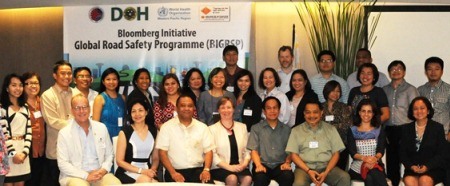
Media, lawyers, legal institutions, road safety stakeholders and advocates participated in the Bloomberg Initiative for Global Road Safety Programme (BIGRSP) Meetings 3-day event organized by WHO Philippines in collaboration with the Department of Transportation and Communication (DOTC) and the Department of Health (DOH) in Manila.
The activities oriented road safety partners / stakeholders on the BIGRSP in the Philippines (2015-2019), discussed preliminary results of legal and media assessments on road safety in the Philippines and generated recommendation on road safety work with emphasis on legislation.
The BIGRSP seeks to reduce fatalities and injuries from road traffic crashes through proven effective strategies such as strengthening road safety legislation and providing technical support through WHO in assessing and revising current legislation; building capacities of selected lawyers on advocating for evidence-based laws and regulations; engaging with journalists to write in-depth road safety stories focused on change and solutions; and developing normative documents reflecting the above efforts.
Why are road traffic injuries and deaths a public health issue?
Globally, 1.24 million road traffic deaths occur every year and the leading cause (#1) of death globally among people aged 15-29 years. Between 20 and 50 million more people suffer non-fatal injuries.
In the Philippines, there were 8,004 deaths from Road Traffic Injuries in 2011, a 15% increase in the absolute number of deaths as compared to 2008 data (6,941).
Road traffic injuries and deaths have a terrible impact on individuals, communities and countries. They involve massive costs to often overburdened health care systems, occupy scarce hospital beds, consume resources and result in significant losses of productivity and prosperity, with deep social and economic repercussions.
Road traffic injuries are public health issue and development crisis that is expected to worsen unless action is taken.
“Road traffic injury is a major public health issue because many of the things that we can do to reduce the number of death and people injured are doable and implementable", says Dr Julie Hall, WHO Representative in the Philippines.
